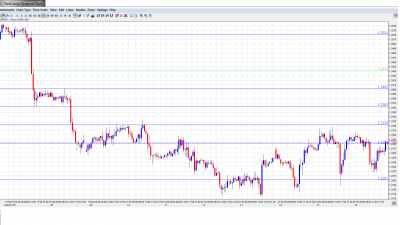EUR/USD has edged downwards, following Fed Chairman Bernanke’s remarks that the Fed was not planning to provide any monetary stimulus in the near future. The markets got some good news from the Euro-zone Current Account, which posted its best results in over three years. The markets will be carefully watching three key releases out of the US on Thursday – Unemployment Claims, Existing Home Sales and the Philly Fed Manufacturing Index.
EUR/USD Technicals
- Asian session: Euro/dollar edged downwards, dropping to a low of 1.2275, and consolidating at 1.2284. The pair has edged downwards in the European session.
- Current range: 1.22 to 1.2280.
Further levels in both directions:
- Below: 1.22, 1.2150, 1.20 and 1.1876.
- Above: 1.2280, 1.2330, 1.2360, 1.24, 1.2440, 1.2520 and 1.2624.
- 1.2330 is the next strong resistance line.
- The pair continues to test the 1.2280 line.
- 1.22 is only a minor line before the clear historic separator of 1.2150.
Euro/Dollar quiet as markets await key US data – click on the graph to enlarge.
EUR/USD Fundamentals
-
8:00 Euro-zone Current Account. Exp. 5.3B. Actual 10.9B.
-
12:30 US Unemployment Claims. Exp. 367K.
-
14:00 US Existing Home Sales. Exp. 4.64M.
-
14:00 US Philly Fed Manufacturing Index. Exp. -7.9 points.
- 14:00 US CB Leading Index. Exp. -0.1%.
- 14:30 US Natural Gas Storage. Exp. 34B.
For more events and lines, see the Euro to dollar forecast
EUR/USD Sentiment
- Fed takes no action: The markets were hoping that weak US data might cause the Fed to take action, but again, Bernanke disappointed, opting to stay on the sidelines. In his testimony to the Senate Banking Committee on Tuesday, Bernanke acknowledged that the unemployment was unlikely to improve and that the economic recovery was “fragile”. He repeated that the Fed was prepared to act, but gave no details. It appears there will be no QE in the near future, and Operation Twist is as far as the Fed is willing to go, at least for the time being.
- US continues to produce weak data: For the second consecutive month,the highly respected UoM Consumer Sentiment dropped, and was also below market expectations. The indicator came in at 72.0 points, disappointing the markets, which had predicted a reading of 73.5 points. Retail Sales, a key consumer indicator, fell by 0.5%. This figure was well below the market forecast and was the second straight drop. As well, Building Permits were slightly below the market prediction. Clearly, the US road to recovery continues to be a bumpy one. More key data will be released on Thursday, and the numbers could affect the direction of EUR/USD.
- Germany not immune from Euro-zone contagion: It’s no secret that Germany continues to be the workhorse of the Euro-zone economy, and in return, Berlin often calls the shots regarding financial matters, such as setting the bailout terms for the weaker members. However, there are increasing signs that the troubles plaguing the EZ are hurting the German economy. This includes a host of weak German economic data, diminishing confidence in the economy, and weak global growth. A Germany in decline could spell disaster for the struggling Euro-zone. The euro lost ground after Chancellor Angela Merkel publicly stated that she was uncertain if the Euro-zone would be successful. Although she did say she was “optimistic”, her remarks were enough to spook the already nervous markets.
- Italy next for bailout?: The Euro-zone’s third largest economy is plagued by soaring borrowing costs, declining growth and the risk of contagion from Greece and Spain. Adding to the woes, the Moody’s credit agency lowered Italy’s credit rating last week. With this mountain of trouble, Italy may ask for a bailout sooner rather than later.
- Dark clouds over Spain: Spanish borrowing costs continue to alarm the markets. Following Thursday’s government bond auction, the yield on 10-year bonds jumped to 7.02%, above the critical 7% threshold which analysts consider unsustainable. The country has a staggering 24% unemployment rate, and has just introduced a deeply unpopular austerity program. As well, questions and concerns remain with regard to the Spanish bailout.

